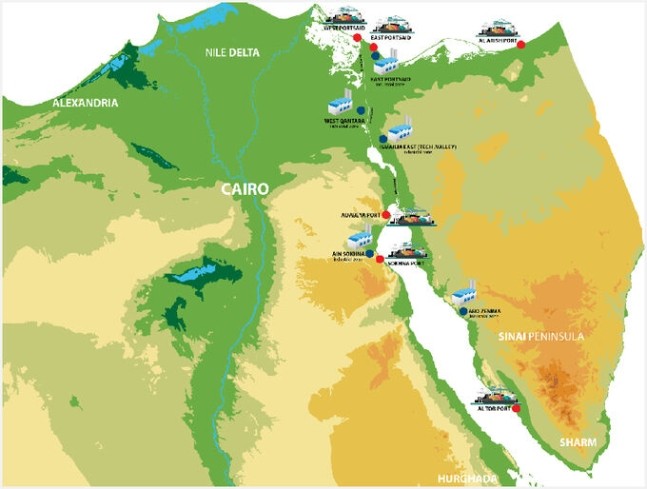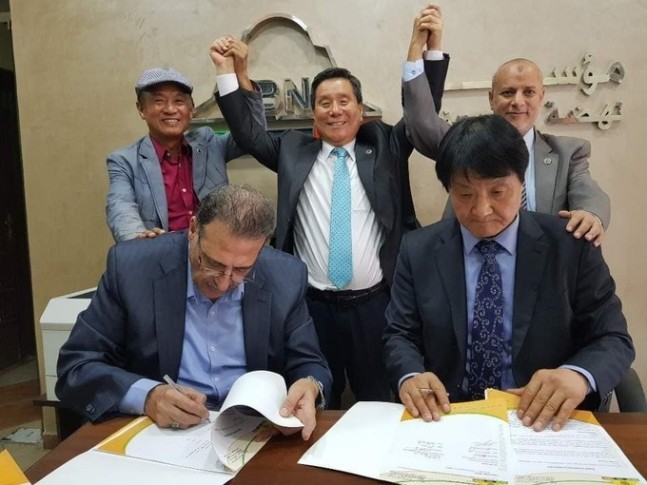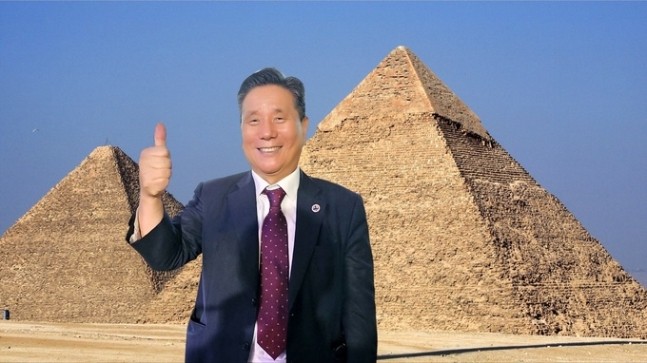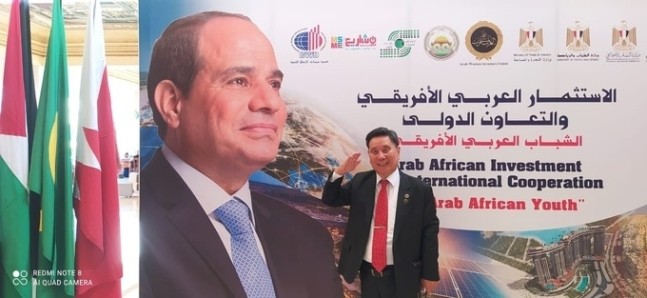Professor Kang Woong-sik, Chairman of the Korea-Egypt Development Association (KEDA) is visiting Egypt with a Korean Business and Industry team to continue their mission in enhancing the relationship between the two countries on all aspects. Here is an interview with Kang Woong-sik, by Park Hee-jun, chief editorial writer, Segye Ilbo Newspaper, Korea, published on May 19, 2024.

Location map of the Suez Canal Special Economic Zone (SCEZ), which Egypt has been promoting since 2015. The Korean industrial complex is being built within the Ain Sokhna Special Economic Zone, close to the new administrative capital, about 67km southeast of Cairo. SCEZ homepage
- Korean industrial complex created in Suez Special Economic Zone
- Doors to Europe and the Middle East open when small and medium-sized businesses move in
- Support for cultural exchange events in April next year
“April 13th next year marks the 30th anniversary of the establishment of diplomatic relations between Korea and Egypt. Imagine this. A scene of a K-pop performance in front of the pyramid. “Isn’t your heart pounding?”
Fate is a very strange thing. A relationship that seems like it will last forever becomes futile in an instant. An unexpected separation can become the joy of meeting. Even if we give each other our sincerity at this moment, it is not enough.

•KEDA Agreemennts on Egypt. (Provided by Chairman Kang Woong-sik)
In an interview with the Segye Ilbo on the 17th, Kang Woong-sik, Chairman of the Korea-Egypt Development Association (KEDA), said, “Egypt is a country that is growing day by day,” and added, “If Korean companies enter the industrial complex being built in the Suez Canal Special Economic Zone in Egypt, they will enjoy tariff-free access to Europe and the Middle East. “Opportunities for export will open up,” he emphasizes. Provided by Chairman Kang Woong-sik
The relationship between Kang Woong-sik , chairman of the Korea-Egypt Development Association (KEDA), and Egyptian President Abdel Fattah el-Sisi is truly unique. Chairman Kang, a graduate of the 37th Military Academy, studied abroad for a year at the Royal Army Staff College, the predecessor of the British Joint Command and Staff College (JSCSC), in 1991 when he was a major. President El-Sisi was an elite Egyptian officer who studied abroad.
Chairman Kang recalls: “After returning home, I was buried in daily life, so I forgot these memories. But his relationship came to him again by chance. It was one day in July 2013, when he retired as the commander of an armored brigade. While watching TV, I heard the familiar name ‘El-Sisi’ on the news about the Egyptian military revolution. President El-Sisi, who was the Minister of Defense at the time, took the lead in overthrowing the regime of Muhammad Morsi, who had ruled arbitrarily, including by pushing for the revision of the ‘Pharaoh (despot) Constitution’.”

A commemorative photo taken in front of the pyramid by Chairman Kang Woong-sik, who visited Egypt early this year. (Provided by Chairman Kang Woong-sik)
Chairman Kang made contact with President El-Sisi for the first time in 23 years. President El-Sisi, who has emerged as a ‘nationalist symbol’ in Egypt, launched his bid for the presidency and was elected with overwhelming support of 97.5% in May 2012. In the presidential election last December, he succeeded in winning a third consecutive term with 89.6% of the vote. He is evaluated as having chosen a strong leader for the Egyptian people to revive the country. President El-Sisi will be responsible for running Egyptian state affairs until April 2030.
When Chairman Kang's family visited Egypt for a week at the invitation of President El-Sisi in 2014, they were welcomed as warmly as his biological family. The two families started talking while reminiscing about their time studying in England 23 years ago. Chairman Kang's son found and took home a drawing of President El-Sisi's son that he had submitted as a class assignment in elementary school, asking him to draw the face of his close friend, and it definitely became a hot topic.
President El-Sisi said, “Mr. King, I was moved to see Korea, which was the poorest country in the world, become a developed country,” and said that he would like to achieve the Korean-style development model in Egypt. Since his days studying abroad, President El-Sisi has called Chairman Kang ‘Mr. King.’ It is said that Arabs had difficulty pronouncing “Kang,” so Chairman Kang made them easier to pronounce it like “King,” “Kang,” or “Kong.” The Omani officer was called “Mr. Kong.”
President El-Sisi said he wanted to become a successful president and asked Chairman Kang to take part in economic and cultural exchanges between the two countries. I and same classmates felt that Mr.Sisi is very humble, honest, and very faithful and worked very hard. So I decided to organize KEDA (Korean Egyptian Development Association) in order to contribute the cooperation and friendship between Egypt and Korea .This is the background to the launch of KEDA, an incorporated association, in August 2015. It is also established in Egypt.
Since then, Chairman Kang has visited Egypt as many as 52 times. We are helping Korean companies advance into Egypt and carrying out activities for friendly cooperation. He visited three times recently: last October, last February, and April. Based on his close relationship with President El-Sisi, he is interacting with high-ranking Egyptian officials and seeking a win-win business model between companies from both countries.

Chairman Kang Woong-sik is taking a commemorative photo in front of a large photo hanging of President Abdel Fattah el-Sisi at the event venue where he was invited to the Arab-African Investment Alliance Business Forum. (Provided by Chairman Kang Woong-sik)
Egypt is accelerating the development of the Suez Canal Special Economic Zone (SCEZ), which has been promoted since 2015 with the goal of becoming a logistics and production hub in the Middle East and Africa. It is an industrial complex built around the Suez Canal, which runs from the Mediterranean Sea to the Red Sea, with an area of 130㎢ which is 44.8 times the size of Yeouido, and is an ambitious plan to develop it as the central axis of Egypt's economic development. When President El-Sisi visited Korea for the first time as an Egyptian president in 2016, it was a major topic of discussion. These days, Chairman Kang is passionate about helping Korean companies advance into the Korea Industrial Complex, which will be created within the special economic zone. Chairman Kang said on the 17th that “the entry of Chinese companies, a competing country, is not unusual.”
-What do you think about Egypt after visiting about 50 times?
“I feel that it is getting cleaner day by day and the infrastructure is changing day by day. You can feel that it is a developing country. This was before the family visited Egypt for a month at the invitation of President El-Sisi in 2014. I visited the head of the future strategy office of a large domestic company and asked myself what advice would be best to give to Egypt. He mentioned President Park Chung-hee and the Republic of Korea's development model and advised me to draw up a good five-year economic development plan and emphasize the need to focus on exports. He said that it is also important to attract foreign companies by providing incentives. He informed President El-Sisi that President Park Chung-hee built the Gyeongbu Expressway for the future despite opposition from the public and politicians. As a result, the entire country became a one-day living zone, and as the volume of cargo increased and the economy grew, the automobile industry developed. “Now, Egypt’s infrastructure, including roads and railways, is developing day by day.”
-He might have become an ‘Egyptian doctor.’
“I heard from a representative of a large company I met in Cairo 10 years ago that it costs about 300 million won a year to operate a local branch. Even though it had been in operation for two years at the time, it was at the level of meeting a low-level Egyptian government official. It will cost more now. The human network and information we have built so far in Egypt can help us beyond the local branch operation. “I hope that small and medium-sized businesses that cannot dare to establish foreign branches or expand overseas due to company conditions will utilize our association.”
-It is true that our people recognize the desert, the Nile River, the pyramids, and the Sphinx.
“To be honest, I would be afraid to go because it is an unfamiliar place. I think I might be afraid because I don’t know. Some people mistakenly believe that because Egypt is in Africa, most people are black. If you go there in person, you will be surprised to realize that it is a treasure trove of culture. It is a very important country geopolitically. President El-Sisi always boasts, ‘We are the hub of Africa and the Middle East.’ The Suez Canal connects Europe and Asia. It is a country that has no choice but to develop in the future. The population reaches 115 million and increases by 10 million a year. It is incomparable to our country's decline from 300,000 to 200,000. Half of the engineers, doctors, and teachers in oil-rich countries in the Middle East, such as Saudi Arabia, the United Arab Emirates (UAE), and Kuwait, are Egyptian. Egyptians have a high standard. Egypt's biggest source of income is the remittance of wages from 8 million people living abroad. “Tourism and Suez Canal tolls are a major source of income.”
-They say an area for Korean companies will be built in the Suez Canal Special Economic Zone.
“The Suez Canal Special Economic Zone is largely divided into four, and the Ain Sokhna Special Economic Zone is the largest. Korean companies are hoping to come in there. The Ain Sokhna Special Economic Zone is located close to the new administrative capital, about 67km away from Cairo, which has a population of 24 million. The President's Office, Prime Minister's Office, National Assembly, and each administrative agency are all concentrated in the new administrative capital. With the completion of the 10-lane road, you can reach the Ain Sokhna Special Zone from the New Administrative Capital in 45 minutes. “It takes 20 minutes by car to the adjacent port and 1 hour to the airport.”
-Which company will have an advantage in entering the market?
“It is optimal for labor-intensive companies such as toys, textiles, and clothing to enter the market. Egypt is also requesting entry into construction materials, electronic and automobile parts, chemical products, and medical equipment. In particular, cosmetics, pharmaceuticals, medical devices, and defense products, which require difficult certification procedures when exporting from Korea to Egypt, can be processed simply in one stop. “If our company enters the SCEZ, we plan to strongly request active support from the Egyptian government and especially the resumption of direct flights.”
-What are the benefits of advancing there?
“Egypt is located at the crossroads of Europe, the Middle East, and Africa. Although a free trade agreement (FTA) has not been concluded with Korea, the European Union (EU), African Continental Free Trade Area (AfCFTA), South American Common Market Mercksur, Turkiye, Common Market for Eastern and Southern Africa (COMESA), and Pan-Arab Free Trade We have signed FTAs with about 105 countries through GAFTA.
Photos:
- Chairman Kang Woong-sik is taking a commemorative photo in front of a large photo hanging of President Abdel Fattah el-Sisi at the event venue where he was invited to the Arab-African Investment Alliance Business Forum. (Provided by Chairman Kang Woong-sik)
- A commemorative photo taken in front of the pyramid by Chairman Kang Woong-sik, who visited Egypt early this year. (Provided by Chairman Kang Woong-sik)
- Location map of the Suez Canal Special Economic Zone (SCEZ), which Egypt has been promoting since 2015. The Korean industrial complex is being built within the Ain Sokhna Special Economic Zone, close to the new administrative capital, about 67km southeast of Cairo. )SCEZ homepage(
- Arriving at Cairo Airport, May 25, 2024
Comments